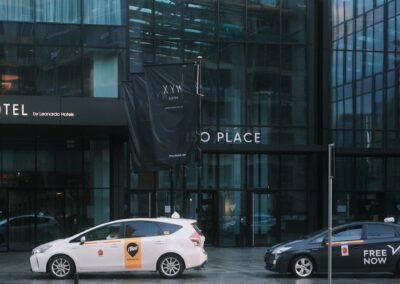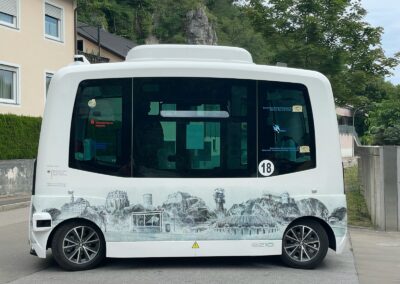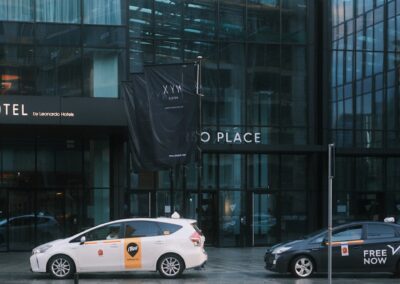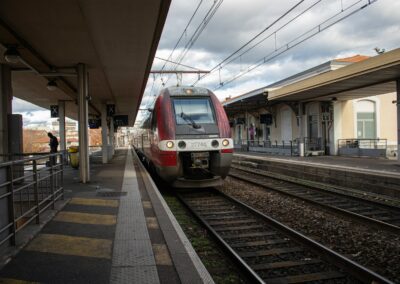Exploring Innovative Solutions for Urban Mobility Challenges
Urban mobility pilot programs are pivotal in addressing the challenges faced by rapidly growing urban environments. These initiatives serve as testing grounds for cutting-edge technologies and innovative solutions, shaping the future of transportation. Through effective communication and change management, stakeholders can navigate the complexities of integrating new technologies into urban environments. Business executives and entrepreneurs can leverage these programs to drive success by embracing emerging trends and enhancing leadership capabilities. As we look ahead, collaboration and partnership among diverse stakeholders will be crucial for accelerating progress towards resilient and sustainable urban transportation systems. By investing in continuous learning and adaptation, we can build a better future together, prioritizing equity, accessibility, and environmental stewardship.
The Rise of Urban Mobility Pilot Programs
As urban populations burgeon and cities face increasing pressure on their transportation infrastructures, the need for innovative solutions has never been more pressing. In response to this challenge, urban mobility pilot programs have emerged as crucial testing grounds for new transportation technologies and services. These programs, often conducted in partnership with governments, businesses, and research institutions, aim to evaluate the feasibility and impact of novel approaches to urban transportation in real-world environments.
Addressing Urban Mobility Challenges
Urban mobility pilot programs serve as laboratories for experimentation, allowing stakeholders to assess the viability of cutting-edge solutions in addressing the complex challenges of urban transportation. By leveraging technologies such as Artificial Intelligence (AI) and Blockchain, these initiatives seek to optimize existing infrastructure, enhance efficiency, and promote sustainability. From autonomous vehicles and ride-sharing platforms to electric scooters and bike-sharing schemes, a diverse array of innovations is being put to the test.
The Importance of Effective Communication and Change Management
Successful implementation of urban mobility pilot programs hinges not only on technological innovation but also on effective communication and change management strategies. As stakeholders navigate the complexities of integrating new technologies into urban environments, clear communication channels and robust change management protocols are essential for garnering public support, addressing concerns, and fostering collaboration among diverse stakeholders.
Driving Business Success through Urban Mobility Innovation
Unlocking Opportunities for Management Consulting and Executive Coaching
For business executives, mid-level managers, and entrepreneurs, urban mobility pilot programs represent more than just a testing ground for transportation technologies—they offer a unique opportunity to drive business success. Management consulting firms and executive coaching services can play a pivotal role in helping organizations navigate the complexities of urban mobility innovation. By providing strategic guidance, leadership development, and project management support, these services enable businesses to capitalize on emerging trends and stay ahead of the curve.
Navigating the Metaverse of Urban Mobility
As urban mobility pilot programs continue to evolve, the emergence of the Metaverse—a virtual reality space where physical and digital worlds converge—holds immense potential for transforming the way we experience and interact with urban environments. Generative Artificial Intelligence (AI) algorithms, powered by vast amounts of data collected from pilot programs, can create virtual simulations to model and optimize urban transportation systems. By immersing stakeholders in these virtual environments, decision-makers can gain valuable insights and make informed choices that drive business success.
Leadership and Management Skills for the Future
In an era defined by rapid technological advancement and disruption, leadership and management skills have never been more critical. Urban mobility pilot programs offer a unique opportunity for executives and managers to hone their leadership capabilities, adapt to change, and foster innovation within their organizations. By embracing the challenges and opportunities presented by urban mobility innovation, businesses can cultivate a culture of agility, resilience, and forward-thinking that propels them towards sustainable growth and success.
Conclusion: Embracing the Future of Urban Mobility
In conclusion, urban mobility pilot programs represent a pioneering approach to tackling the complex challenges of transportation in rapidly growing urban environments. By serving as testing grounds for cutting-edge technologies and innovative solutions, these programs pave the way for a more efficient, sustainable, and interconnected future. As businesses, governments, and communities continue to collaborate and innovate, the potential for transformative change in urban mobility is limitless.
Looking Ahead: Opportunities and Challenges
As we look to the future, it’s essential to recognize both the opportunities and challenges that lie ahead in the realm of urban mobility. While advancements in technologies such as AI and Blockchain hold promise for revolutionizing transportation systems, they also raise important questions about privacy, equity, and ethical considerations. By addressing these challenges head-on and prioritizing inclusive and sustainable solutions, we can ensure that urban mobility innovation benefits all members of society.
Collaboration and Partnership: Keys to Success
Ultimately, the success of urban mobility pilot programs hinges on collaboration and partnership among stakeholders from diverse sectors. By fostering an ecosystem of innovation, where ideas are shared, tested, and refined, we can accelerate progress towards more resilient, efficient, and people-centric urban transportation systems. Whether it’s through public-private partnerships, academic research initiatives, or community engagement efforts, every stakeholder has a role to play in shaping the future of urban mobility.
Continued Learning and Adaptation
As technologies evolve and urban landscapes change, the journey towards sustainable urban mobility is a continuous process of learning and adaptation. By remaining agile and responsive to emerging trends and challenges, businesses and organizations can stay ahead of the curve and seize new opportunities for growth and innovation. Whether it’s through ongoing education and training programs or strategic partnerships with technology providers, investing in the development of human capital is essential for navigating the complexities of the modern urban landscape.
A Call to Action: Building a Better Future Together
In conclusion, urban mobility pilot programs offer a glimpse into the possibilities of a more connected, accessible, and sustainable future. By harnessing the power of technology, collaboration, and innovation, we can build transportation systems that not only meet the needs of today but also pave the way for a brighter tomorrow. As we embark on this journey together, let us commit to working towards a shared vision of urban mobility that prioritizes equity, accessibility, and environmental stewardship. Together, we can build a better future for generations to come.
#UrbanMobility #TransportationTech #Innovation #AI #Blockchain #ManagementConsulting #ExecutiveCoaching #Communication #ChangeManagement #BusinessSuccess #LeadershipSkills #ProjectManagement























